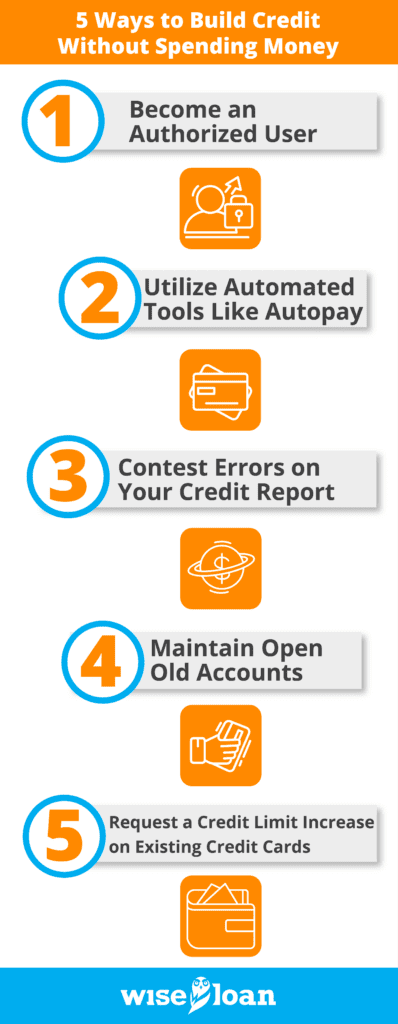How to Build Your Credit
Looking to improve your credit but can’t afford to make credit purchases at the moment? Congratulations on having a responsible understanding of debt! We have some good news: You can take certain actions to enhance your credit without spending money.
- Become an Authorized User
- You can build credit and positively impact your credit score without even having your own credit. By becoming an authorized user, you can leverage someone else’s credit card account. Here’s how it works:
- Ask someone with a credit card account in good standing to add you as an authorized user.
- Confirm that their credit card company reports payment history for both the account owner and authorized users.
- The credit card company should start reporting their account information on your credit report.
- As the account holder manages their account responsibly by making timely payments and maintaining low credit balances, you will also benefit from the positive information reflected on your report.
Pros: No credit history is required, and no expenditure is necessary.
Cons: If you’re an authorized user and the account holder misses payments or accumulates high credit card balances, it could have a negative impact on your credit score.
- Utilize Automated Tools Like Autopay
Making all your payments on time is one of the best long-term strategies for maintaining good credit. However, life can be unpredictable, and it’s easy to forget a payment amidst a busy schedule or personal issues. Setting up automated payments can help mitigate this risk.
Pros: You can set up autopayments and rest assured that your bills will be paid on time. Timely payments are reported to your credit history and can positively influence your credit score.
Cons: You must ensure that you have sufficient funds in the designated accounts for autopayments. Additionally, you will have less flexibility in adjusting payment schedules to align with your monthly income.
- Contest Errors on Your Credit Report
Inaccurate negative information on your credit report can lower your credit score. Errors can range from simple typos to accounts appearing on your report that don’t belong to you. It’s important to review your credit report periodically to ensure its accuracy. Obtain a copy of your report from each of the three major reporting bureaus through AnnualCreditReport.com.
Thoroughly review the entire report and identify any potential inaccuracies. Dispute these inaccuracies by writing a letter to the relevant credit bureau. Make sure to:
- Include a copy of your credit report with the inaccuracies highlighted.
- Provide a concise but comprehensive explanation of the inaccuracies.
- Attach any supporting documents that bolster your side of the story.
- Request that the credit bureau investigate the matter and either correct or remove the item.
- You can send your disputes to the following addresses:
- Equifax Information Services LLC; P.O. Box 740256; Atlanta, GA 30348
- Experian; P.O. Box 4500; Allen, TX 75013
- TransUnion LLC Consumer Dispute Center; P.O. Box 2000; Chester, PA 19016
Pros: Federal law ensures that you have the right to a fair and accurate credit report. The Fair Credit Reporting Act mandates that credit bureaus investigate reported inaccuracies promptly. If the entity reporting the information, typically the creditor, fails to provide supporting documentation, the credit bureau must correct or delete it. Disputing inaccuracies is a relatively simple method to rectify such issues.
Cons: Successful dispute resolutions are typically limited to genuinely inaccurate items. It may also require some time and effort for research.

- Maintain Open Old Accounts
The age of your credit accounts influences your credit score. Credit age refers to both the duration of your overall credit history and the average age of your open accounts. Closing an account affects this average age, which can impact your credit score.
Consider the following example to understand how this works:
– Sue has a loan that’s been open for five years, a student loan with a 15-year history, and a credit card that’s been active for 10 years. The average age of her accounts is 10 years.
– Sue receives a better credit card offer, so she opens a new account and closes the old one.
– Now, Sue has a loan that’s 5 years old, a student loan that’s 15 years old, and a credit card that’s brand new. The average age of her accounts is now 6.67 years.
However, if Sue had kept her old account open, she would have four credit accounts with ages 5, 15, 10, and 0. The average age would be 7.5.
While you can’t always keep accounts open, especially if you’ve paid off a car loan or personal installment loan, you do have the choice with certain credit cards and credit lines. Therefore, consider the implications for credit age before closing them.
Pros: Maintaining an account open requires minimal effort. Simply refrain from closing it. You may need to use the card periodically and make payments to keep it active.
Cons: Keeping multiple credit card or credit line accounts open may tempt you to make purchases beyond your means, leading to significant and costly debts. Avoid this approach if you know you won’t be able to resist using the cards.
- Request a Credit Limit Increase on Existing Credit Cards
Credit utilization is another factor in your credit score, referring to the percentage of your total credit limit that you are utilizing. For instance, if you have a credit card limit of $2,000 and a balance of $1,500, your credit utilization is 75%.
Higher credit utilization can have a negative impact on your credit score. While paying down your balances is one way to address this issue, another option, if you want a quick positive change without spending more, is to request a credit limit increase.
If you have good credit and are in good standing with your account, your credit card company might be willing to grant your request. A higher limit automatically results in a lower utilization rate.
Pros: This tip only requires you to spend some time on the phone with your credit card company.
Cons: Most credit card companies require good credit to consider your request. Furthermore, as with the previous tip, you expose yourself to the risk of accumulating more debt. Avoid this option if you know you’ll only end up increasing your card balances.
Bonus Tip: Apply for a Loan With Wise Loan
You don’t need excellent credit to get approved for a loan from Wise Loan, and they report timely payments to two of the three credit bureaus. This can help improve your credit. Plus, you don’t have to spend any money upfront. Simply retain the loan funds and use them to repay the loan. Apply for a Wise Loan today.
The recommendations contained in this article are designed for informational purposes only. Essential Lending DBA Wise Loan does not guarantee the accuracy of the information provided in this article; is not responsible for any errors, omissions, or misrepresentations; and is not responsible for the consequences of any decisions or actions taken as a result of the information provided above.
More information on Installment Loans and how they work in your state:











